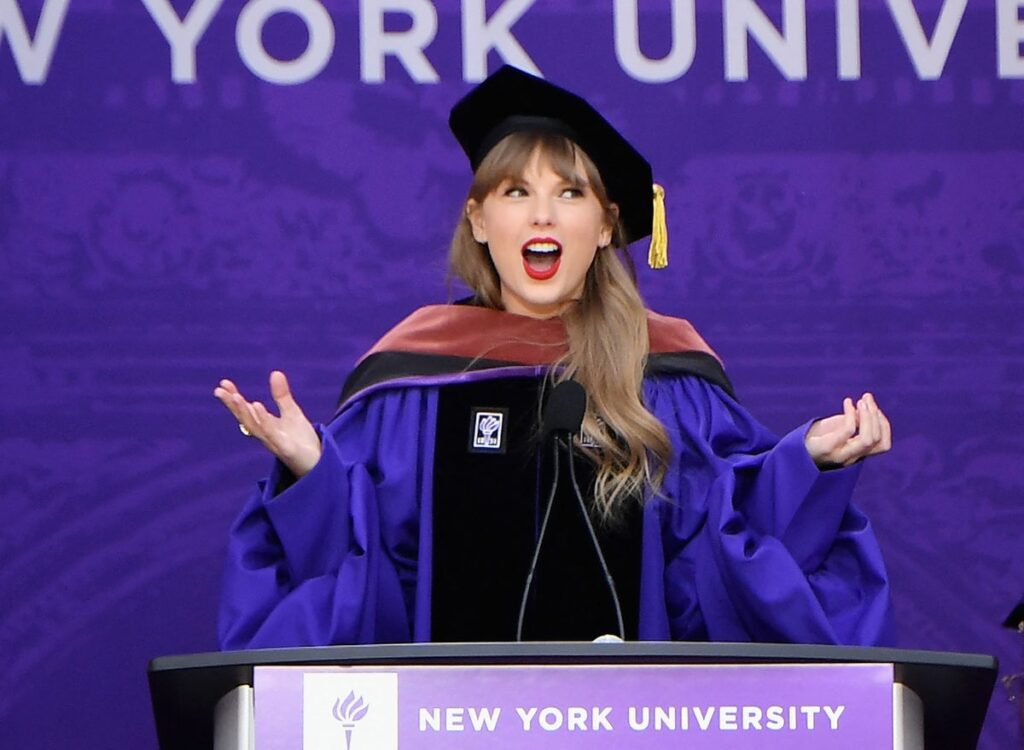September 25, 2025
3 min read
Scientists Take on Taylor Swift’s Linguistic Eras
An analysis of Taylor Swift’s interviews suggests her speech pattern has changed over her career
Taylor Swift delivered a commencement address to New York University graduates in May 2022.
Angela Weiss/AFP via Getty Images
Researchers have confirmed what Taylor Swift fans have long suspected: the music megastar’s dialect and pitch have shifted throughout her career.
In the early stages of Swift’s music career, while she was living near Nashville, Tennessee, her speech had the hallmarks of a southern US accent. When she released her pop album Red in 2012, the southern twang had faded, suggest researchers who have analysed her voice. It changed again when she moved to New York City, they say.
A person’s dialect is typically associated with the region they are from, although it can change throughout their lifetime. But being able to study how they change is rare, says Matthew Winn, an audiologist at the University of Minnesota Twin Cities in Minneapolis. “We cannot typically follow someone around with a microphone,” he says.
On supporting science journalism
If you’re enjoying this article, consider supporting our award-winning journalism by subscribing. By purchasing a subscription you are helping to ensure the future of impactful stories about the discoveries and ideas shaping our world today.
Enter Tay Tay. “Taylor Swift has essentially been followed around with the microphone for most of her adult life,” says Winn.
Swift interviews
In the study published today in The Journal of the Acoustical Society of America, Winn and his colleague analysed more than 100 minutes of Swift’s interviews across three distinct eras of her career. In 2008, Swift released Fearless while living near Nashville; in 2012, she released Red; and in 2019, Lover was released when she lived in New York City.
The pair used computer software to track how the pronunciation of Swift’s vowels changed. “As a person changes dialects — within English at least — mostly those changes are reflected in the vowels,” says Winn.
Early in her career, Swift’s pronunciation of ‘i’ in words such as ‘ride’ became shorter, pronouncing the word more like ‘rod’, which the researchers say is a classic southern US feature. The ‘oo’ sound in words like ‘two’ also changed to sound like ‘tee-you’, another southern signature.
Swift’s vowels lengthened around the time she started singing more pop music, with a clearer distinction between words such as ‘cot’ and ‘caught’, which the authors say is a feature of dialects in Pennsylvania, where Swift grew up, and New York.
The researchers suggest that these changes reflect Swift’s desire to be part of those communities. “I was one of those people who thought of dialects mainly as reflecting where you come from, but they obviously also reflect what kind of community you want to be a part of,” says Winn.
Alice Gaby, a linguist at Monash University in Melbourne, Australia, says that the study confirms what people have noted — that Swift had a fairly marked shift in her pronunciation once she moved to Tennessee and then back to Pennsylvania again.
But Swift is no different from many other people who adapt their dialect throughout their lives, says Gaby. “It’s interesting to note that the change is not just specific to the location but also how she’s positioning herself,” she adds.
The researchers also found that the pitch of Swift’s voice got lower when she moved to New York City, a change that they suggest coincided with her emergence as a vocal advocate on social issues. But they acknowledge that this change might be age related.
Nature has reached out to Swift for comment on the study results.
This article is reproduced with permission and was first published on September 23, 2025.
It’s Time to Stand Up for Science
If you enjoyed this article, I’d like to ask for your support. Scientific American has served as an advocate for science and industry for 180 years, and right now may be the most critical moment in that two-century history.
I’ve been a Scientific American subscriber since I was 12 years old, and it helped shape the way I look at the world. SciAm always educates and delights me, and inspires a sense of awe for our vast, beautiful universe. I hope it does that for you, too.
If you subscribe to Scientific American, you help ensure that our coverage is centered on meaningful research and discovery; that we have the resources to report on the decisions that threaten labs across the U.S.; and that we support both budding and working scientists at a time when the value of science itself too often goes unrecognized.
In return, you get essential news, captivating podcasts, brilliant infographics, can’t-miss newsletters, must-watch videos, challenging games, and the science world’s best writing and reporting. You can even gift someone a subscription.
There has never been a more important time for us to stand up and show why science matters. I hope you’ll support us in that mission.

